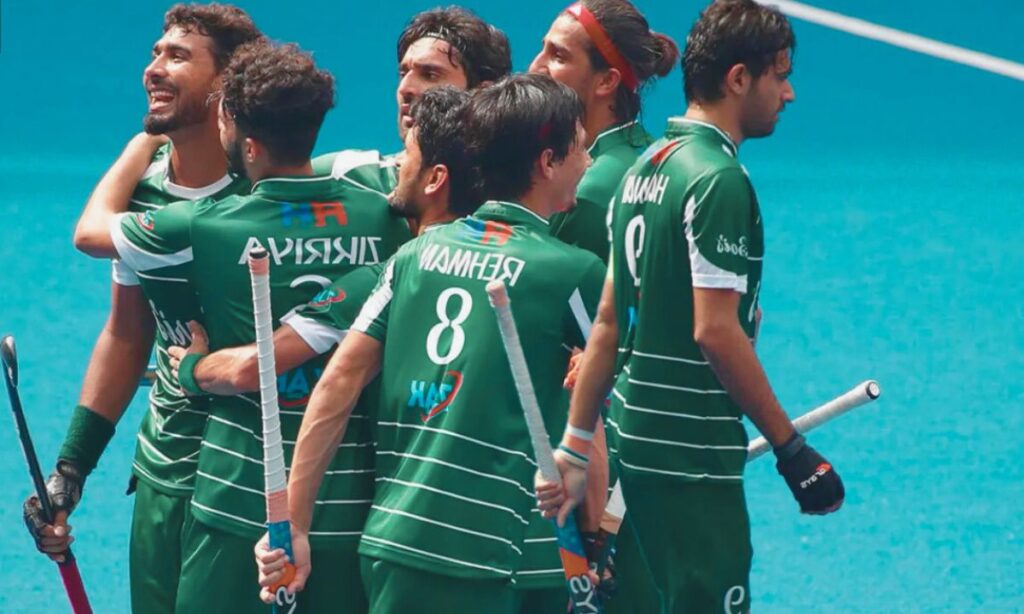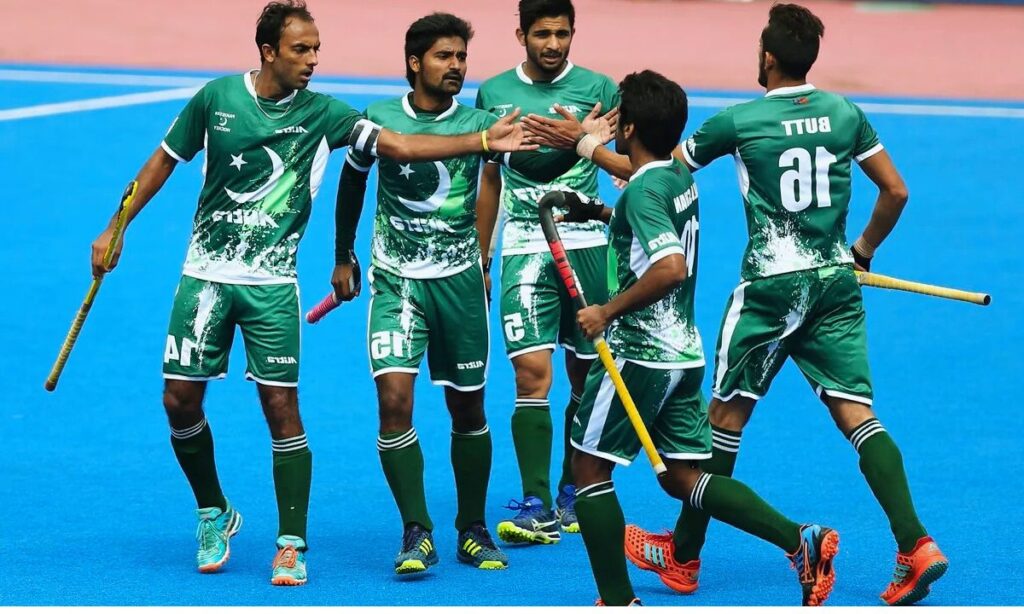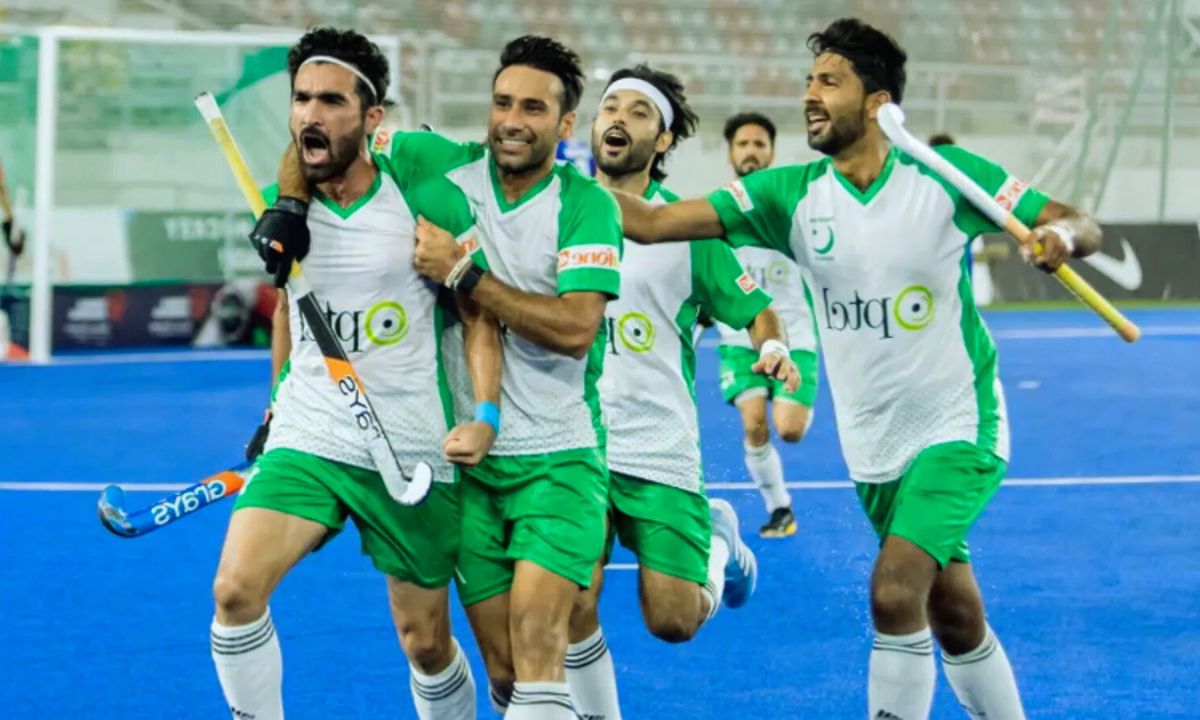The future of Pakistan’s participation in the 2025–26 FIH Pro League is hanging by a thread. While an invitation to rejoin world hockey’s elite offers a rare glimmer of hope, a crippling financial crisis threatens to undo this golden opportunity. With past glory in their veins but mounting budget issues at hand, the question now is whether Pakistan can reclaim its lost legacy or be left watching from the sidelines once again.
A Comeback Built on Circumstance
Pakistan’s men’s hockey team didn’t directly qualify for the FIH Pro League. Instead, they were extended an invitation after New Zealand—who earned their spot by winning the FIH Nations Cup—declined participation. This twist of fate could have revived Pakistan’s international standing, giving them the chance to face global giants like Germany, India, and the Netherlands from December 2025 to June 2026.
The Financial Wall Blocking Pakistan’s Return
Despite the promising invite, the Pakistan Hockey Federation (PHF) lacks the financial resources to send the team to the league. A budget of 700 million rupees (around USD 2.5 million) is needed for the campaign. Unfortunately, the Pakistan Sports Board (PSB) has not approved the release of the funds, citing a lack of transparency in previous expenditures.

A Pattern of Mismanagement
The PSB has demanded a full audit of the funds already released to the PHF. Without that, further funding is unlikely. This echoes a troubling pattern: when the FIH Pro League launched its first edition, Pakistan confirmed participation—only to withdraw later due to financial shortfalls. That move cost them a fine of 170,000 euros, damaging both reputation and trust.
Politics and Bureaucracy Delay Decisions
An official from the PSB has indicated that a proposal will be sent to the Prime Minister for the release of special funds. However, because the PHF hasn’t clarified how earlier allocations were spent, there’s speculation that the government might change the federation’s top leadership before approving the funds. These internal dynamics are now as much of a hurdle as the budget itself.
A Glorious Past Held Hostage by Present Failures
It’s heartbreaking for fans and former players alike. Pakistan has an unmatched history in Asian hockey—with eight Asian Games gold medals and three Champions Trophy titles. Yet, this same nation is now begging for a financial lifeline just to show up on the world stage. The emotional disconnect between its proud past and its unstable present is painful to witness.
Criticism from Legends
Olympic gold medallist Rasheedul Hassan has publicly criticized the PHF, blaming years of mismanagement for the crisis. His voice echoes the frustration of a nation that once ruled the turf but now struggles to field a team. The outcry is not just about the money; it’s about accountability, transparency, and restoring pride in the green shirt.
Missed Opportunities and Waning Influence
Pakistan failed to qualify for the last three Olympic Games and the recent World Cup. These missed opportunities have diminished its presence in international hockey. Participation in the FIH Pro League could offer the exposure and competition needed to rebuild the team—but only if they can actually afford to go.
Players Stuck in Limbo
While officials debate and budgets stall, the players are caught in limbo. Young athletes who’ve trained for years now face the possibility of watching another generation go by without international exposure. The human cost of this uncertainty cannot be overstated—it’s not just careers on the line, it’s dreams.
The Risk of Repeating History
This isn’t the first time Pakistan has been handed a lifeline and failed to grasp it. If they back out again, not only do they risk another financial penalty, but they further isolate themselves from the world hockey community. Repeated absences hurt rankings, morale, and credibility.
International Reputation on the Line
Pakistan’s withdrawal from the inaugural FIH Pro League due to financial constraints had already drawn criticism. A second no-show would likely damage their reputation further, possibly discouraging future invitations. Global sports bodies value consistency and reliability—something Pakistan must prove now more than ever. If they fail again, they risk being labeled unreliable participants, making it harder to re-enter future events even if the performance improves.
International Reputation on the Line
Missing out on FIH Pro League action twice could seriously dent Pakistan’s global standing. Top-tier teams remember who shows up and who withdraws. If Pakistan pulls out again, other national federations might question their reliability, making future invitations less likely. That could isolate them from elite competition and stunt the team’s comeback momentum. Beyond finances, this isn’t just about money—it’s about reputation. If Pakistan wants to restore its standing in the hockey world, making a bold presence at the Pro League is essential.
Pressure on Leadership Shake-up
As news of funding hurdles spreads, calls grow louder for new leadership in the PHF. Many insiders argue that a change at the top could bring fresh energy and credibility. With millions at stake, the Prime Minister’s office may demand a transparent audit and possibly appoint interim heads. If the PHF wants to secure the special funds they desperately need, they’ll have to show serious organizational change. It’s a moment of reckoning—either old leadership adapts or Pakistan brings in new stewards to protect its hockey legacy.
Sponsors Holding Their Breath
Corporate sponsors are hesitant to commit until the PHF demonstrates fiscal responsibility. After past scandals and the initial Pro League dropout, companies have grown wary. They want detailed budgets, expenditure reports, and a clear roadmap before offering support. If the PHF can outline exactly how each rupee will be spent—travel, lodging, daily allowances—sponsors may reengage. But with the PSB now asking for full accounts, the PHF is under intense scrutiny. This financial transparency could rebuild corporate trust, but time is running out before August.
Players’ Morale Under Threat
Behind the scenes, players are fighting an emotional battle. Training for months in hopes of a grand return, they now face uncertainty. The stress of waiting for funds leaks into locker‑room talks, affecting focus and mood. Psychologists note that such pressure can derail performance. Some veteran players say they feel abandoned, as if the federation doesn’t believe in them. If Pakistan misses the Pro League, it would be a gut punch for players who trained tirelessly. Reassurance and investment in player well‑being are vital now to keep morale alive.
The Fans’ Loyal But Wary Support
Pakistani hockey fans have watched their nation fall from grace over decades. But their loyalty is fierce—they post hopeful messages after the Pro League invitation. Still, repeated financial failures threaten to erode that hope. If the team once again can’t take part, fans will feel burned. Social media already buzzes with disappointment. Yet, there is cautious optimism. A last‑minute funding success could reignite passion nationwide. The PHF knows it must act swiftly—not just for medals, but to safeguard fan trust, which is hard‑won and easily lost.
Learning from the Nations Cup
Pakistani players performed admirably in the recent Nations Cup, reaching the final before losing to New Zealand. That campaign showed they are ready to compete at the top. It also revealed how close they are to regaining global form. What they lack isn’t skill—it’s funding and logistics. A strong Nations Cup run should have been their springboard aboard the Pro League. Now, the effort risks going to waste. Reframing that momentum into financial backing could salvage this opportunity and showcase just how deserving the team is.
Long-Term Development Stalled
Missing the FIH Pro League isn’t just a short‑term setback—it stalls development pipelines. Young players learn most from facing the best. Without consistent exposure to top opponents, their growth slows. Funding gaps also disrupt junior programs, scouting, coaching clinics, and fitness camps. Pakistan risks losing its generation coming up through the ranks. Conversely, solid funding transformed into Pro League participation could trigger a revival—from grassroots all the way to the national team. It’s not simply about one tournament—it’s about rebuilding an entire ecosystem.
Government’s Dilemma and Opportunity
The PSB’s hesitation reflects a national dilemma. Resources are tight, and priorities are many. But this is a moment for decisive leadership. Approving the 700 million rupees could deliver more than just sporting success—it can unite a nation under a shared cause. Pakistan’s hockey legacy is a source of pride, and a visible investment here could win public goodwill. The government must weigh optics against budgets. Funding the Pro League team sends a powerful message—that Pakistan still backs its national symbols, even in lean times.
A National Revival in Sight
Imagine the buzz if Pakistan lines up in Pro League matches against Germany, India, or the Netherlands. The roar of fans at Gaddafi Stadium or Hockey Club will echo beyond sport. A sponsored training tour in Europe, quality jerseys, and access to top coaches could shake up the national program. Pakistan could launch a revival—hockey once again at the heart of cultural identity. This moment is a crossroads: crumble from neglect, or build a comeback carefully funded and passionately supported.
The Final Countdown
Now, with the August 12 deadline looming, every stakeholder—from PHF officials to players, sponsors, and fans—holds their breath. The question isn’t whether Pakistan can compete—you’ve seen them rise in Nations Cup. The question is whether they receive the support needed to turn potential into performance. If the funds arrive and the team travels, it could rewrite the narrative. If not, it signals another chapter of missed opportunity. And that would do more than hurt trophies—it would hurt hope. The next few weeks will decide if Pakistan’s storied hockey resurgence becomes a reality or a dream deferred.
The Legacy Pakistan Risks Losing
Pakistan’s hockey legacy is unlike any other in Asia. From Olympic golds to Asian Games domination, their trophy cabinet tells a story of pride, power, and perseverance. Missing the FIH Pro League again would mean turning away from that legacy. It would send the message that the nation is no longer interested in competing at the top. The absence wouldn’t just be felt on the field—it would echo through history, disappointing generations who once looked to hockey as a symbol of national glory.
FIH’s Unexpected Lifeline
The International Hockey Federation (FIH) didn’t have to offer Pakistan a spot. But they did—because they still see potential in the team and the fanbase. It was a gesture of trust and belief in Pakistan’s ability to contribute to the sport at a global level. If the opportunity is declined, that trust may be lost for good. Pakistan needs to realize this isn’t just a ticket to a tournament. It’s a rare second chance handed to them by the world’s governing body. And second chances are not handed out twice.
A Golden PR Opportunity
For the PHF and the government, this crisis could turn into a golden public relations opportunity. Supporting the Pakistan hockey team’s FIH Pro League campaign shows commitment to sport, youth, and national pride. In a country often burdened with political strife, sport has the power to unify. News of government support would earn praise from fans, young athletes, and former players alike. If handled right, this could become a positive headline, not just a financial burden.
The Clock Is Ticking
With less than a month left to confirm participation, time is Pakistan’s biggest enemy. Planning for international travel, scheduling matches, arranging visas, and booking accommodations all require coordination. Delaying action risks logistical chaos even if the money comes through later. The PHF and Sports Board must act fast—not just to secure funding but to initiate the massive operational machinery that international competition demands. Every day wasted chips away at the team’s preparation window and trust in the system.
Global Media Is Watching
This story isn’t just local news—it has caught the attention of global sports media. Outlets covering international hockey have reported Pakistan’s financial dilemma. If they fail to participate again, headlines will cast Pakistan as unreliable. However, a comeback story—where a nation rallies in time to return to global hockey—could make global headlines for all the right reasons. How the country handles this moment will either enhance or diminish its global sporting image.
From Crisis to Comeback
Every great sporting nation has faced its share of setbacks. What separates the fallen from the legendary is how they respond. Pakistan’s hockey team now stands at a defining point in its history. If they step into the Pro League against the odds, it will inspire a new generation. It will prove that no setback is permanent. That a legacy, once lost, can be reclaimed. The world loves an underdog story—and Pakistan could write the most powerful one yet.
The Role of Former Legends
Veterans like Rasheedul Hassan and other Olympians have started speaking out, criticizing PHF’s inefficiency. But their voices can also be harnessed for positive influence. They could lead fundraising campaigns, meet government officials, or even mentor players. When legends speak, people listen. Their involvement could reignite faith in the system. Bringing them into the fold shows unity and honors the very heritage the current team is trying to uphold.

The Emotional Weight on Young Players
For the younger players who made it to the Nations Cup final, the current uncertainty feels cruel. They proved themselves on the field, only to face administrative delays off it. Dreams that were once vivid now hang in limbo. Many come from humble backgrounds, and this opportunity was their gateway to a better future. The emotional toll of being kept in the dark affects not just performance but also trust in the system. They deserve clarity, not confusion.
Media’s Role in Raising Pressure
Local and national media outlets have an important part to play. By consistently covering the crisis and giving voice to players, former legends, and fans, the press can hold authorities accountable. Visibility breeds urgency. When public pressure mounts, government offices often move faster. Strong editorial advocacy could be the tipping point that pushes this story from tragedy to triumph. The media must stay loud, focused, and unrelenting in its coverage.
Final Word: A Moment Pakistan Must Not Waste
Pakistan’s participation in the FIH Pro League isn’t just about competing in another tournament—it’s about signaling that the country still cares about one of its greatest sporting treasures. It’s about resilience, identity, and pride. Letting this moment slip away would mean more than a missed game. It would be a lost opportunity to restore hope, rebuild a broken system, and revive a sport that once made the country proud. The nation has a choice to make—step forward or stand still.
What Needs to Happen Now
To avoid another national embarrassment, the PHF must act swiftly—submit clear financial records, rebuild trust with the PSB, and make the case for urgent support. Meanwhile, fans, former players, and sports leaders must keep the pressure on decision-makers. This is more than a funding issue. It’s a crossroads moment that will define the future of hockey in Pakistan.

